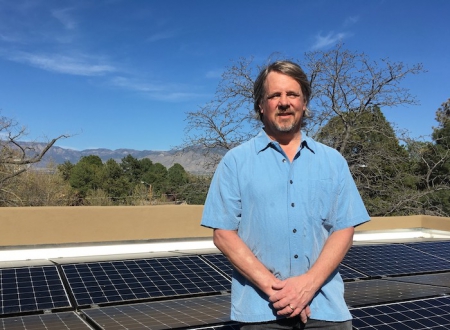
Jasper (Joe) Hardesty,was elected to the ARCUS Board of Directors in 2018 and his term ends in 2021. He is also a member of the ARCUS Membership and Development Committee.
Joe works at Sandia National Labs, out of Albuquerque, New Mexico, where there is plenty of (non-Arctic) desert. He is the Assistant Manager of the Alaska Arctic facilities for the Department of Energy Atmospheric Radiation Measurements (ARM) program with sites at Utqiaġvik/Barrow, Atqasuk, and Oliktok Point, Alaska, and having assets that include controlled airspaces, unmanned aircraft, and tethered balloon systems. These sites and systems support instrumentation and field campaigns to provide Arctic atmospheric measurements and data used by climate modelers around the world.
Joe's degrees are in architecture and urban planning (University of Illinois) and chemical engineering (Stanford University). As an architect and planner, he has overseen all aspects of major institutional and commercial projects, with a focus on sustainable development, ecotourism, and responsible cultural tourism. As a researcher, he has contributed to Arctic projects for atmospheric study, building and infrastructure resilience, and renewable energy systems; as well as non-Arctic work with natural resource sustainability, biofuels, food security, international chemical/biological security, decontamination, and pollution remediation. In addition to his ARM work, Joe's current efforts are focused on expanding the repertoire of capabilities at Sandia Labs being applied to Arctic research, mentoring early career researchers, and planning for development of a comprehensive, permanent, year-round U.S. High Arctic Research Center and infrastructure network in Alaska.
A common thread in Joe's work is a desire to connect disparate perspectives to fulfill our responsibilities as stewards of the environment and communities around us. Having worked with private business, government institutions, and philanthropic organizations, he sees opportunities where the ARCUS vision for collaborative, interdisciplinary Arctic research and outreach can raise awareness of Arctic issues and impacts of a rapidly warming Arctic on lower latitudes in order to garner greater national support for Arctic programs. He would like to see greater pan-Arctic research coordination, including integration of local knowledge, citizen science, and academic research to fill gaps in our understanding of changes in the Arctic to inform appropriate responses.
